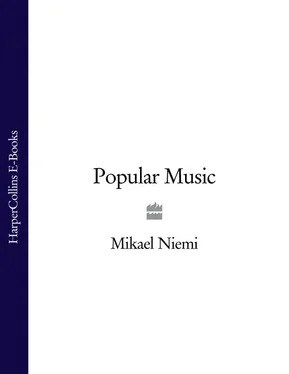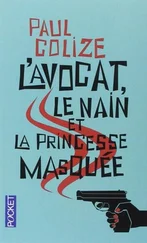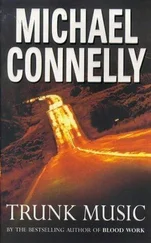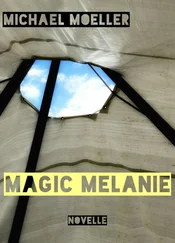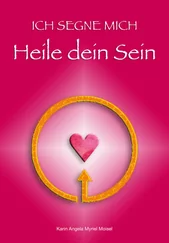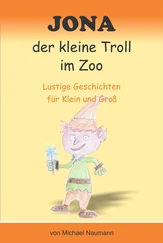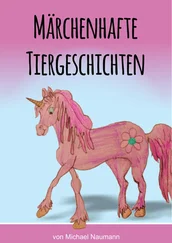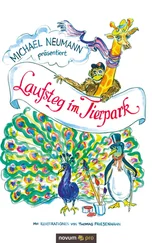Anyway, we started throwing snowballs at them. Mainly so they’d regard us as being manly, I think. And believe it or not, it worked. These lanky sixteen-year-old Valkyries would scamper off like reindeer, screaming and shrieking, holding up their make-up bags as shields. They really made a meal of it. We were only throwing loosely packed little bundles of snow that rarely hit them, after all – fluffy lumps of snow that came floating down like woolly Lapp mittens. But it was enough to impress them. We were a force to be reckoned with.
It went on like this for a few days. We made a store of snowballs as soon as we got home from school. By now we felt like soldiers from Vittulajänkkä fighting in the Winter War, two battle-scarred veterans in action on a foreign continent. We bristled in expectation. Fighting brought us closer and closer to pleasures we could only dream of. Our coxcombs grew with every battle fought.
There came the flock of girls. Several bunches with irregular intervals between them. As they approached, we crouched down behind the ramparts of snow piled up at the side of the road by the snow plough. The plan was worked out in great detail. We used to let the first group pass by unscathed, then throw the snowballs at their backs while the other groups came to a halt in front of us. Create disarray and panic. And admiration, of course, of our manly deeds.
We crouched down in wait. Heard the girls’ voices approaching, the smokers’ coughs, the giggles. We stood up at exactly the right moment. Each of us with a snowball in our right hands. Like two fearsome Vikings we watched the girls scamper away, screaming. We were just going to heave our missiles into their midst when we suddenly realised that one of the girls was standing her ground. Only a couple of yards in front of us. Long, blond hair, neatly made-up eyes. She was staring straight at us.
‘Just you dare throw one more snowball, and I’ll kill you,’ she snarled. ‘I’ll hit you so hard, you’ll never be able to walk again. I’ll make such a mess of your faces that your mothers will burst into tears the moment they clap eyes on you…’
Niila and I slowly lowered our snowballs. The girl gave us one last, terrifying look, then turned on heel and strolled after her friends.
Niila and I didn’t move. We didn’t even look at each other. We just felt we’d been terribly misunderstood, in spades.
As a boy in Pajala, one’s life was dominated by chain thrashings. They were a means of adjusting the balance of power between the male citizens of the village. You were drawn into them as a young lad of five or six, and didn’t escape until you were fourteen or fifteen.
Chain thrashings took something like the following form: a few little lads would start arguing. Anders thumped Nisse, who started crying. I won’t go into the cause of the argument, whether there was a history of animosity or some kind of family feud hovering in the background. A young lad simply thumped another one, and then they went home.
That’s when the chain reaction starts.
The one on the receiving end, Nisse, immediately tells his two-years-older brother about it. Big brother goes out into the village and keeps his eyes skinned: the next time he comes across Anders he gives him a good hiding and extracts revenge. Anders goes home crying his eyes out and tells his own four-years-older brother, who goes out into the village and keeps his eyes skinned. The next time he comes across Nisse or Nisse’s elder brother, he gives them a good hiding and issues a series of threats into the bargain. (Are you still with me?) Nisse’s five-years-older, burly first cousin hears an abridged version of what has happened and beats up Anders’s brother, Anders himself and a few friends who tagged along as bodyguards. Both Anders’s two friends’ six-years-older brothers go out into the village and keep their eyes skinned. The rest of Nisse’s brothers, cousins and other relatives hear an abridged version of what has happened, who has beaten up whom, and in what order; the same thing happens on Anders’s side. Exaggerations in the interests of propaganda are common. Eighteen-year-old second cousins twice removed and even fathers receive urgent requests for assistance, but claim they couldn’t give a shit about the petty squabbles of little kids.
That gives some idea of how things developed. The most elaborate of chain thrashings would involve classmates, neighbours and an entire range of friends, especially if the two original combatants came from different parts of the village. In that case it was Vittulajänkkä versus Paskajänkkä, or Strandvägen versus Texas, and war was declared.
The duration of a chain thrashing could be anything from a few days to several months. The norm was a few weeks, following the pattern described above. The first stage was scuffling and an exchange of blows with little kids crying. Then came the threat stage, with the strongest ones involved roaming the village with their eyes skinned while the little kids stayed in hiding at home. If any of the little brats got caught, it was no laughing matter, believe you me. I used to think that was the worst stage, that non-stop terror between school and the relative safety of home. Last of all came the disarmament stage, when nobody could remember or be bothered to remember all those complicated patterns of punishment with all the subtle variations, and the whole thing ran out of steam.
But before that happened, life was dominated by the balance of terror. It’s winter and you’re on your own on your kick-sledge, gliding over the tightly packed snow to the corner shop where you’re going to buy a bag of mixed sweets. It’s mid-afternoon, but it’s already quite dark, and scattered snowflakes are drifting down from the endless lead-grey sky, sparkling under the street lamps like stars. You’re standing with one foot on the runner of your sledge, clinging on to the handlebar and kicking with your other foot, skimming your way between the mountains of snow piled up on each side of the road by the ploughs. Your runners are being held back a bit by the newly fallen snow, and from the nearby main road to Kiruna you can hear the booming of a snow plough bludgeoning its way through the winter. And then, just ahead at the crossroads, one of the big boys materialises. The black silhouette of a pupil from the senior school. He comes towards you, you slow down and try to make out who it is. You consider turning back, but you see there’s another big lad closing in from behind. Hard to make out who it is in the gloom, but he’s certainly big. You’re surrounded, a little boy on a kick-sledge. All you can do is hope. Square your shoulders and advance towards the first of the big boys, who eyes you up and down. The street lamps are snowing, his face is in the shadows, and now he steps forward and your heart stands still. You try to prepare yourself for what’s coming, snow down the back of your neck and all down your back and into your trousers, your ears boxed so hard you can feel your skull coming loose, your woolly hat thrown up into a birch tree, sobs and snot and humiliation. You stiffen up like a calf as the slaughterer approaches. And now he’s right in front of you and you have to stop. He’s as big as an adult, but you don’t recognise him. He asks you whose boy you are, and you recall that there are at least three chain thrashings on the go at the moment, your mind is working overtime, then you tell him who you claim to be, and hope you’ve hit upon the right answer. And the bloke puckers up his eyebrows and knocks your hat off into the snow. Then he says:
‘Lucky for you!’
And you brush the snow off your hat, set off again, and wish to God you were a grown-up.
The end of winter was in sight, the worst of the cold was over. The days were still short, but in the lunch break you could occasionally catch a glimpse of the sun over the frosty roof-tops, looking like a blood-orange. We drank in the light in greedy gulps, and the fiery deep orange juice filled us with renewed lust for life. It was like crawling out of a burrow, waking up from hibernation.
Читать дальше
